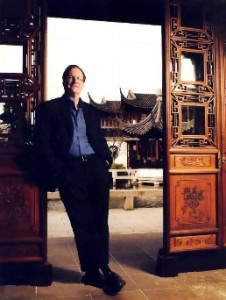
Composer Robert Kyr taken from “Peace Work” (Portland Monthly). (Photo Stuart Mullenberg/courtesy Williams College)
(WILLIAMSTOWN, Mass.) – The centenaries of Chapin Hall and composer John Cage will be recognized in a free concert by the Berkshire Symphony on Friday, November 2, 2012, at 8 p.m. in Chapin Hall on the Williams College campus. The concert will also pay tribute to the late Williams College music professor Ernest D. Brown, with a new composition written by his colleague, Andy Jaffe. The concert will also includes works by Robert Kyr, Carl Maria von Weber and Paul Hindemith
The Berkshire Symphony has much to celebrate starting with the centenary of Chapin Hall, home of the orchestra. The acoustics and surroundings of this beautiful concert hall have contributed much to the growth of the Berkshire Symphony and could even be considered one of the orchestra’s great musical collaborators.
The Berkshire Symphony plans to fill the hall with sound – and with silence. This year also marks the centenary of one of the 20th century’s most influential composers, John Cage. His piece, 4’33” is one of his best known and controversial. It instructs the performer not to play for four minutes and thirty-three seconds. The piece has one thing in common with any great musical gesture: it provokes thought in every person who experiences it, focusing on an aspect of performance that few listeners consider — that is, the role of silence in a performance.
“Every Day Blues” is a tribute to Prof. Ernest D. Brown by his colleague, Andy Jaffe, director of jazz studies and a well-known performer, arranger, composer, and author of seminal studies of jazz music theory. “Every Day Blues” blends African, American, and European traditions. Mr. Jaffe based his composition on the notes and initials E, D, and B and translates his jazz sensibility into an orchestral setting.
The orchestra also presents artist associates Susan Martula, clarinet, and Floyd Hebert, flute, in the Double Concerto for Flute and Clarinet by Robert Kyr. The composer has been featured before by the Berkshire Symphony and enjoys the reputation as one of the most prolific and lyrical composers of his generation. In his reflections about the piece, Robert Kyr states, “The double concerto is a musical embodiment of my experience as a mediator, who leads opposing individuals (or groups) through a process of reconciliation that guides them toward respectful dialogue, understanding, and true collaboration. The piece is commissioned in honor of Floyd Hebert and Susan Martula by Scott and Emily Congel, and David Perry.
Presenting listeners with a musical mirror, the orchestra also performs Symphonic Metamorphosis of Themes by Carl Maria von Weber by Paul Hindemith, as well as an excerpt from the piece which inspired it: Turandot by Carl Maria von Weber.
By pairing students with their teachers and mentors throughout the rehearsal period, and throughout the season, Williams students in the Berkshire Symphony are exposed to a level of professionalism and discipline that is rare in an educational setting. At the same time, the students’ infectious enthusiasm contributes to the Berkshire Symphony’s remarkable energy and rich sound. This makes the Berkshire Symphony unique and very exciting.
Sponsored by the Class of 1960 Scholars Fund, there is also a pre-concert talk with composer Robert Kyr in Brooks-Rogers Recital Hall, adjacent to the lobby of Chapin Hall. These events are free and open to the public.
